University Financial Analysis: Tesco Plc Performance and F Score
VerifiedAdded on 2022/08/22
|6
|887
|10
Report
AI Summary
This report presents a financial analysis of Tesco Plc, evaluating its performance using various financial metrics and the F score. The introduction explains the concept of the F score, a measure of accuracy used in financial analysis. The analysis covers profitability ratios, including return on assets (ROA), operating cash flow, leverage, liquidity, and operating ratios. The report assesses Tesco's performance over several years, providing F scores for each metric based on its trend. The analysis highlights key findings, such as the company's ability to utilize assets, cash generation from operating activities, and debt levels. The conclusion summarizes the company's financial health based on the analysis and F score calculations, supported by references to relevant financial literature and a graphical representation of the F score trends over five years.
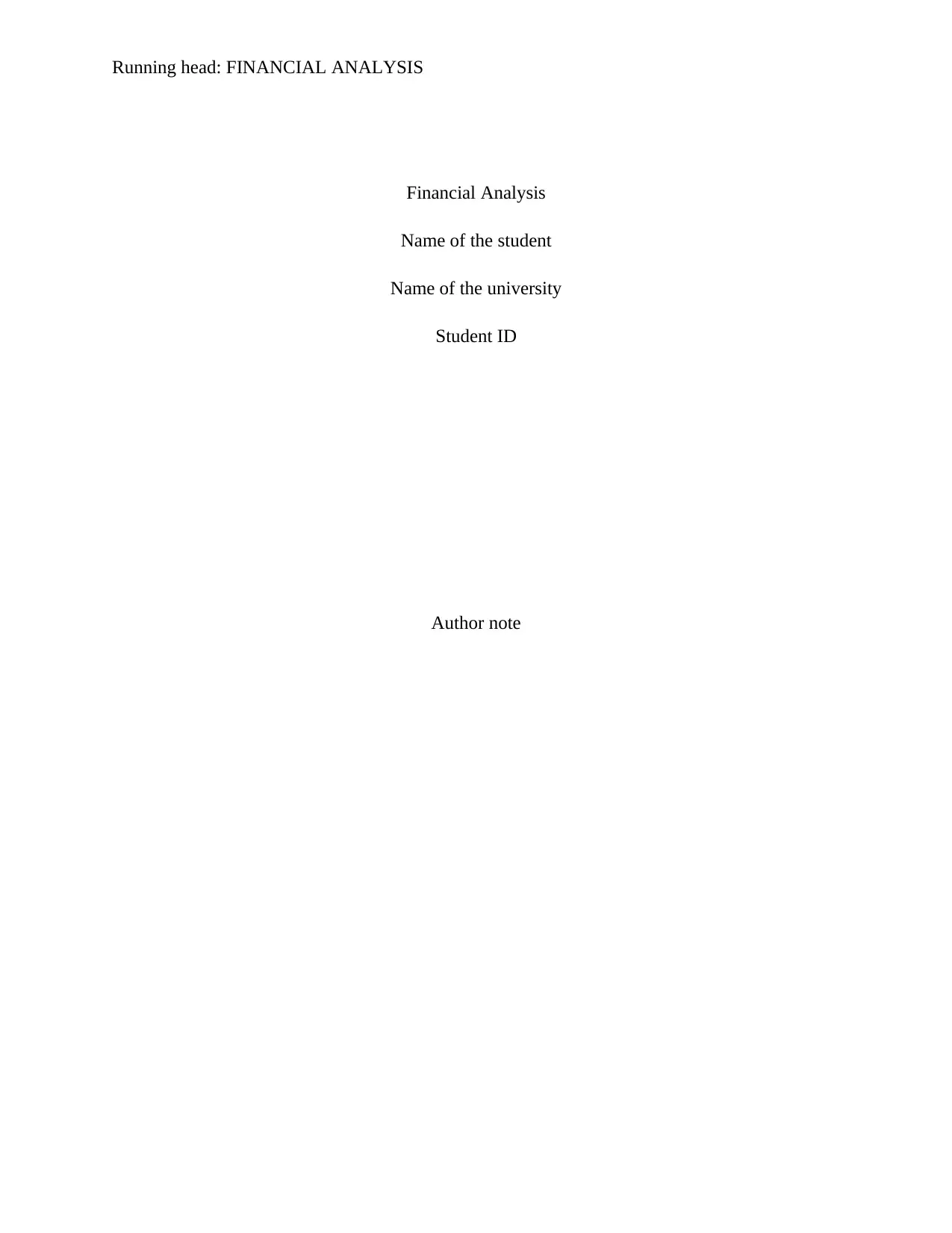
Running head: FINANCIAL ANALYSIS
Financial Analysis
Name of the student
Name of the university
Student ID
Author note
Financial Analysis
Name of the student
Name of the university
Student ID
Author note
Paraphrase This Document
Need a fresh take? Get an instant paraphrase of this document with our AI Paraphraser
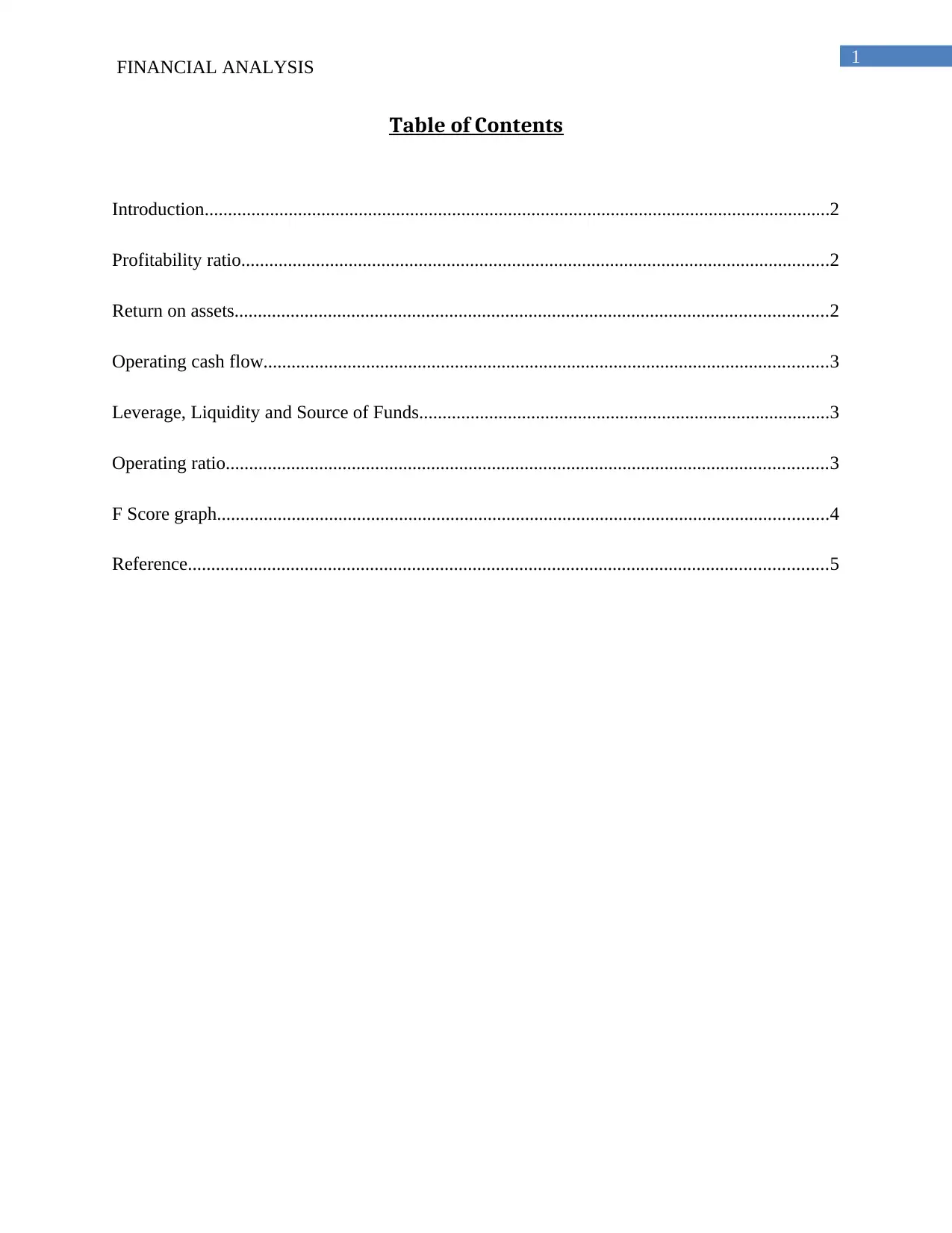
1
FINANCIAL ANALYSIS
Table of Contents
Introduction......................................................................................................................................2
Profitability ratio..............................................................................................................................2
Return on assets...............................................................................................................................2
Operating cash flow.........................................................................................................................3
Leverage, Liquidity and Source of Funds........................................................................................3
Operating ratio.................................................................................................................................3
F Score graph...................................................................................................................................4
Reference.........................................................................................................................................5
FINANCIAL ANALYSIS
Table of Contents
Introduction......................................................................................................................................2
Profitability ratio..............................................................................................................................2
Return on assets...............................................................................................................................2
Operating cash flow.........................................................................................................................3
Leverage, Liquidity and Source of Funds........................................................................................3
Operating ratio.................................................................................................................................3
F Score graph...................................................................................................................................4
Reference.........................................................................................................................................5
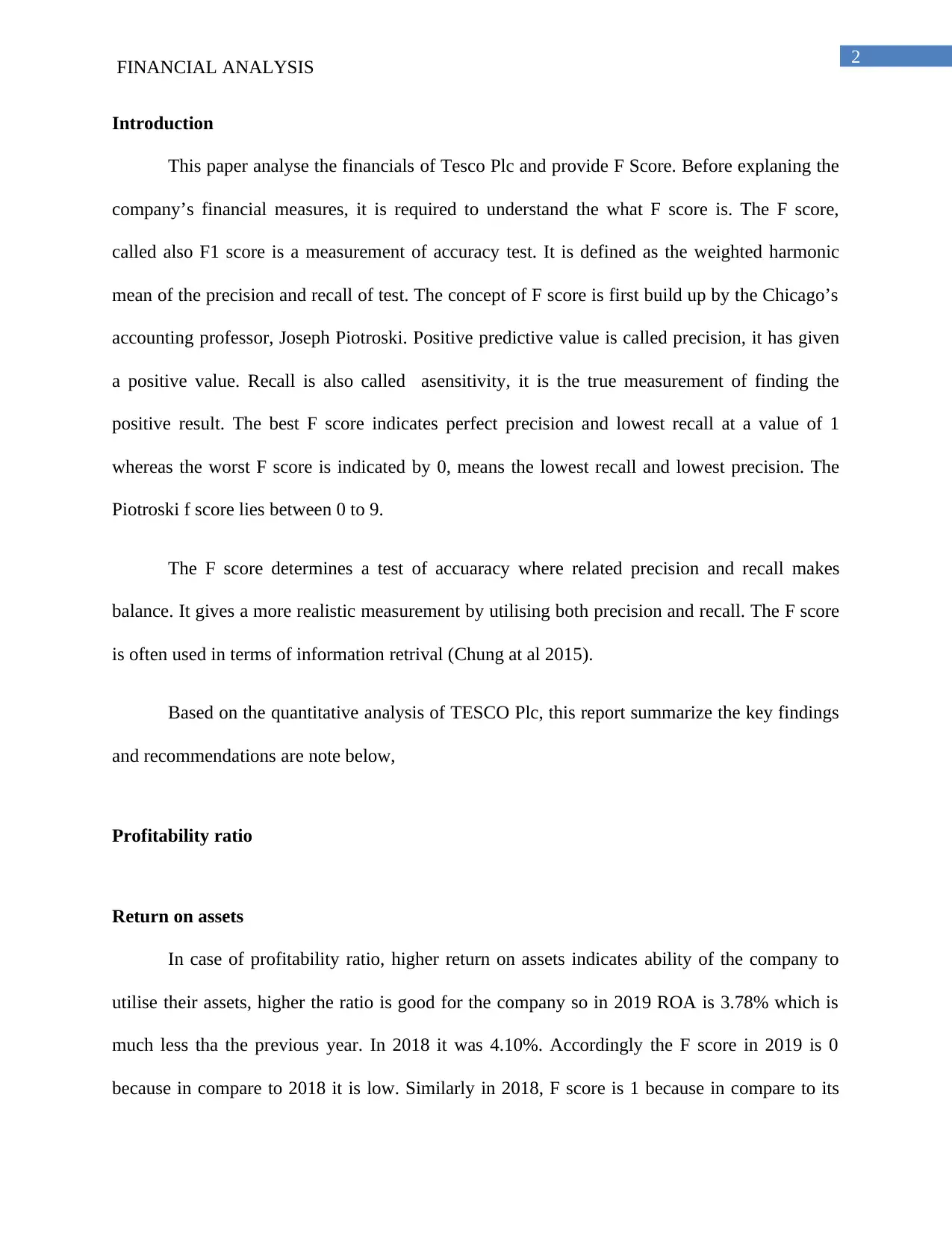
2
FINANCIAL ANALYSIS
Introduction
This paper analyse the financials of Tesco Plc and provide F Score. Before explaning the
company’s financial measures, it is required to understand the what F score is. The F score,
called also F1 score is a measurement of accuracy test. It is defined as the weighted harmonic
mean of the precision and recall of test. The concept of F score is first build up by the Chicago’s
accounting professor, Joseph Piotroski. Positive predictive value is called precision, it has given
a positive value. Recall is also called asensitivity, it is the true measurement of finding the
positive result. The best F score indicates perfect precision and lowest recall at a value of 1
whereas the worst F score is indicated by 0, means the lowest recall and lowest precision. The
Piotroski f score lies between 0 to 9.
The F score determines a test of accuaracy where related precision and recall makes
balance. It gives a more realistic measurement by utilising both precision and recall. The F score
is often used in terms of information retrival (Chung at al 2015).
Based on the quantitative analysis of TESCO Plc, this report summarize the key findings
and recommendations are note below,
Profitability ratio
Return on assets
In case of profitability ratio, higher return on assets indicates ability of the company to
utilise their assets, higher the ratio is good for the company so in 2019 ROA is 3.78% which is
much less tha the previous year. In 2018 it was 4.10%. Accordingly the F score in 2019 is 0
because in compare to 2018 it is low. Similarly in 2018, F score is 1 because in compare to its
FINANCIAL ANALYSIS
Introduction
This paper analyse the financials of Tesco Plc and provide F Score. Before explaning the
company’s financial measures, it is required to understand the what F score is. The F score,
called also F1 score is a measurement of accuracy test. It is defined as the weighted harmonic
mean of the precision and recall of test. The concept of F score is first build up by the Chicago’s
accounting professor, Joseph Piotroski. Positive predictive value is called precision, it has given
a positive value. Recall is also called asensitivity, it is the true measurement of finding the
positive result. The best F score indicates perfect precision and lowest recall at a value of 1
whereas the worst F score is indicated by 0, means the lowest recall and lowest precision. The
Piotroski f score lies between 0 to 9.
The F score determines a test of accuaracy where related precision and recall makes
balance. It gives a more realistic measurement by utilising both precision and recall. The F score
is often used in terms of information retrival (Chung at al 2015).
Based on the quantitative analysis of TESCO Plc, this report summarize the key findings
and recommendations are note below,
Profitability ratio
Return on assets
In case of profitability ratio, higher return on assets indicates ability of the company to
utilise their assets, higher the ratio is good for the company so in 2019 ROA is 3.78% which is
much less tha the previous year. In 2018 it was 4.10%. Accordingly the F score in 2019 is 0
because in compare to 2018 it is low. Similarly in 2018, F score is 1 because in compare to its
⊘ This is a preview!⊘
Do you want full access?
Subscribe today to unlock all pages.

Trusted by 1+ million students worldwide
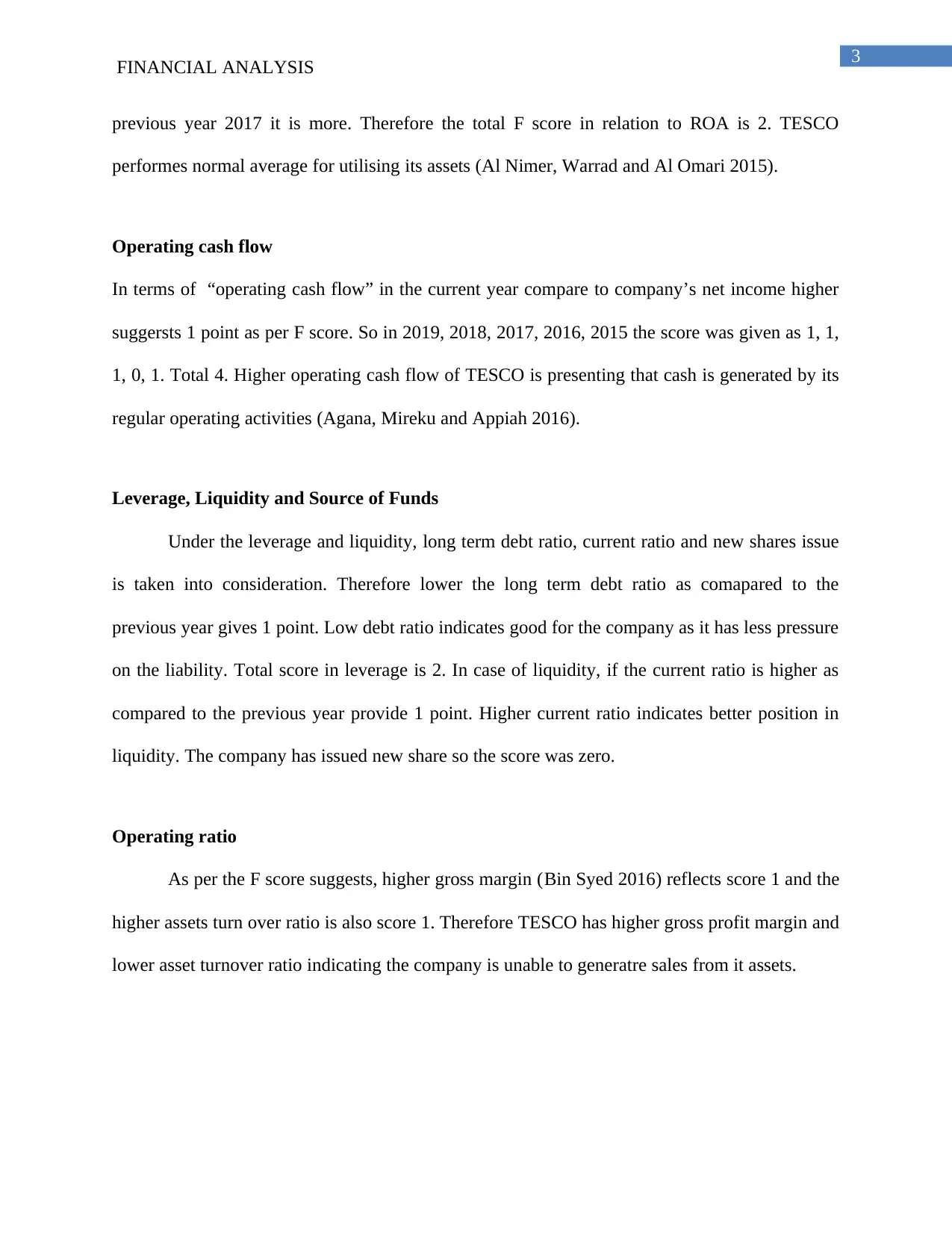
3
FINANCIAL ANALYSIS
previous year 2017 it is more. Therefore the total F score in relation to ROA is 2. TESCO
performes normal average for utilising its assets (Al Nimer, Warrad and Al Omari 2015).
Operating cash flow
In terms of “operating cash flow” in the current year compare to company’s net income higher
suggersts 1 point as per F score. So in 2019, 2018, 2017, 2016, 2015 the score was given as 1, 1,
1, 0, 1. Total 4. Higher operating cash flow of TESCO is presenting that cash is generated by its
regular operating activities (Agana, Mireku and Appiah 2016).
Leverage, Liquidity and Source of Funds
Under the leverage and liquidity, long term debt ratio, current ratio and new shares issue
is taken into consideration. Therefore lower the long term debt ratio as comapared to the
previous year gives 1 point. Low debt ratio indicates good for the company as it has less pressure
on the liability. Total score in leverage is 2. In case of liquidity, if the current ratio is higher as
compared to the previous year provide 1 point. Higher current ratio indicates better position in
liquidity. The company has issued new share so the score was zero.
Operating ratio
As per the F score suggests, higher gross margin (Bin Syed 2016) reflects score 1 and the
higher assets turn over ratio is also score 1. Therefore TESCO has higher gross profit margin and
lower asset turnover ratio indicating the company is unable to generatre sales from it assets.
FINANCIAL ANALYSIS
previous year 2017 it is more. Therefore the total F score in relation to ROA is 2. TESCO
performes normal average for utilising its assets (Al Nimer, Warrad and Al Omari 2015).
Operating cash flow
In terms of “operating cash flow” in the current year compare to company’s net income higher
suggersts 1 point as per F score. So in 2019, 2018, 2017, 2016, 2015 the score was given as 1, 1,
1, 0, 1. Total 4. Higher operating cash flow of TESCO is presenting that cash is generated by its
regular operating activities (Agana, Mireku and Appiah 2016).
Leverage, Liquidity and Source of Funds
Under the leverage and liquidity, long term debt ratio, current ratio and new shares issue
is taken into consideration. Therefore lower the long term debt ratio as comapared to the
previous year gives 1 point. Low debt ratio indicates good for the company as it has less pressure
on the liability. Total score in leverage is 2. In case of liquidity, if the current ratio is higher as
compared to the previous year provide 1 point. Higher current ratio indicates better position in
liquidity. The company has issued new share so the score was zero.
Operating ratio
As per the F score suggests, higher gross margin (Bin Syed 2016) reflects score 1 and the
higher assets turn over ratio is also score 1. Therefore TESCO has higher gross profit margin and
lower asset turnover ratio indicating the company is unable to generatre sales from it assets.
Paraphrase This Document
Need a fresh take? Get an instant paraphrase of this document with our AI Paraphraser
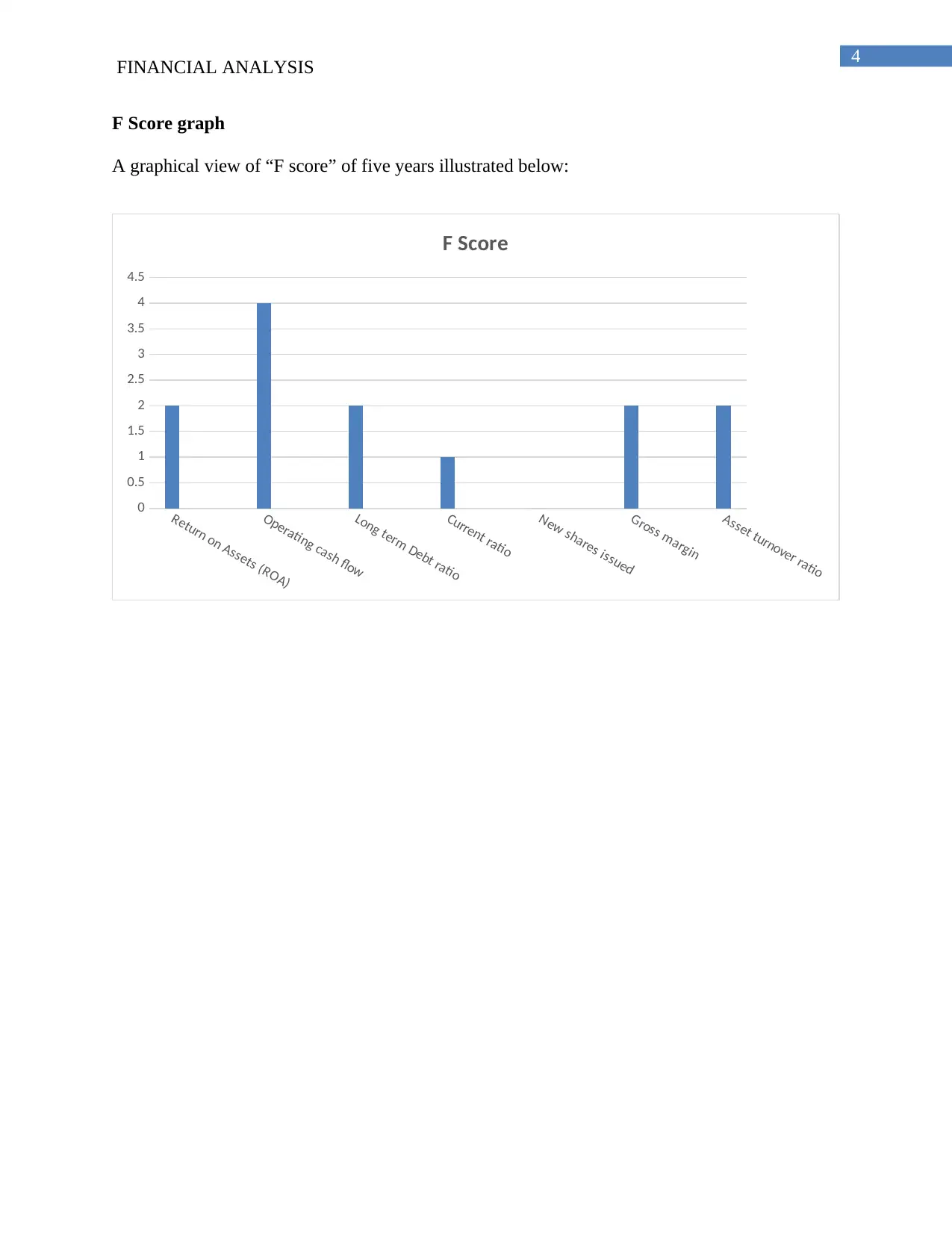
4
FINANCIAL ANALYSIS
F Score graph
A graphical view of “F score” of five years illustrated below:
Return on Assets (ROA)
Operating cash flow
Long term Debt ratio
Current ratio
New shares issued
Gross margin
Asset turnover ratio
0
0.5
1
1.5
2
2.5
3
3.5
4
4.5
F Score
FINANCIAL ANALYSIS
F Score graph
A graphical view of “F score” of five years illustrated below:
Return on Assets (ROA)
Operating cash flow
Long term Debt ratio
Current ratio
New shares issued
Gross margin
Asset turnover ratio
0
0.5
1
1.5
2
2.5
3
3.5
4
4.5
F Score
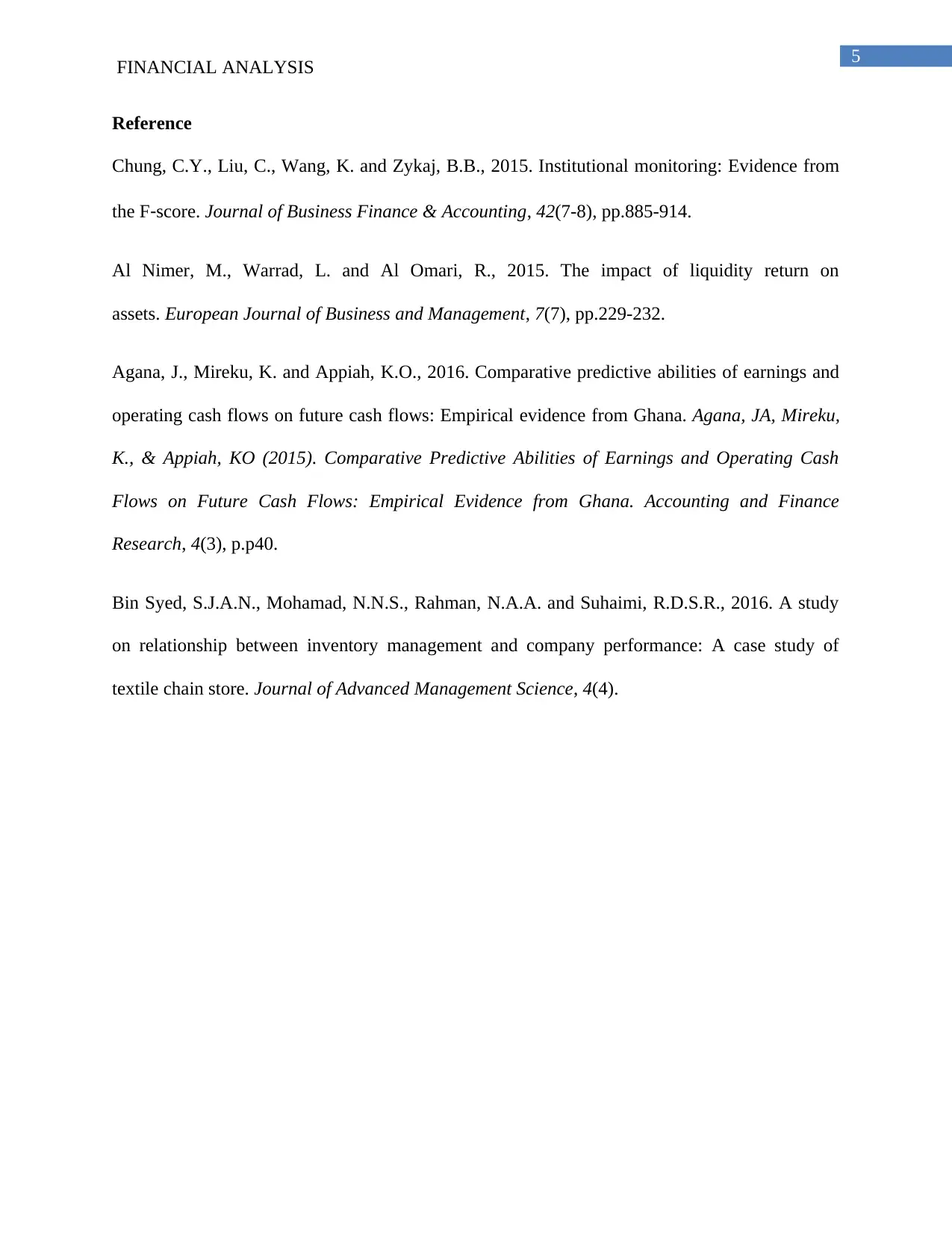
5
FINANCIAL ANALYSIS
Reference
Chung, C.Y., Liu, C., Wang, K. and Zykaj, B.B., 2015. Institutional monitoring: Evidence from
the F‐score. Journal of Business Finance & Accounting, 42(7-8), pp.885-914.
Al Nimer, M., Warrad, L. and Al Omari, R., 2015. The impact of liquidity return on
assets. European Journal of Business and Management, 7(7), pp.229-232.
Agana, J., Mireku, K. and Appiah, K.O., 2016. Comparative predictive abilities of earnings and
operating cash flows on future cash flows: Empirical evidence from Ghana. Agana, JA, Mireku,
K., & Appiah, KO (2015). Comparative Predictive Abilities of Earnings and Operating Cash
Flows on Future Cash Flows: Empirical Evidence from Ghana. Accounting and Finance
Research, 4(3), p.p40.
Bin Syed, S.J.A.N., Mohamad, N.N.S., Rahman, N.A.A. and Suhaimi, R.D.S.R., 2016. A study
on relationship between inventory management and company performance: A case study of
textile chain store. Journal of Advanced Management Science, 4(4).
FINANCIAL ANALYSIS
Reference
Chung, C.Y., Liu, C., Wang, K. and Zykaj, B.B., 2015. Institutional monitoring: Evidence from
the F‐score. Journal of Business Finance & Accounting, 42(7-8), pp.885-914.
Al Nimer, M., Warrad, L. and Al Omari, R., 2015. The impact of liquidity return on
assets. European Journal of Business and Management, 7(7), pp.229-232.
Agana, J., Mireku, K. and Appiah, K.O., 2016. Comparative predictive abilities of earnings and
operating cash flows on future cash flows: Empirical evidence from Ghana. Agana, JA, Mireku,
K., & Appiah, KO (2015). Comparative Predictive Abilities of Earnings and Operating Cash
Flows on Future Cash Flows: Empirical Evidence from Ghana. Accounting and Finance
Research, 4(3), p.p40.
Bin Syed, S.J.A.N., Mohamad, N.N.S., Rahman, N.A.A. and Suhaimi, R.D.S.R., 2016. A study
on relationship between inventory management and company performance: A case study of
textile chain store. Journal of Advanced Management Science, 4(4).
⊘ This is a preview!⊘
Do you want full access?
Subscribe today to unlock all pages.

Trusted by 1+ million students worldwide
1 out of 6
Related Documents
Your All-in-One AI-Powered Toolkit for Academic Success.
+13062052269
info@desklib.com
Available 24*7 on WhatsApp / Email
![[object Object]](/_next/static/media/star-bottom.7253800d.svg)
Unlock your academic potential
Copyright © 2020–2025 A2Z Services. All Rights Reserved. Developed and managed by ZUCOL.





